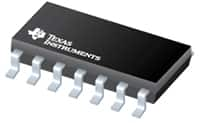OPA4991 40 V Low-Offset-Voltage Low Noise Op-Amp
Author: EIS Release Date: Feb 9, 2021
Texas Instruments' dual 4.5 MHz, rail-to-rail input/output op-amp is suitable for high-voltage industrial applications
 Texas Instruments' OPA4991 is a high-voltage (40 V) general-purpose op-amp that offers exceptional DC precision and AC performance including rail-to-rail input/output, a low offset voltage of ±125 µV, low offset drift of ±0.3 µV/°C, low noise (10.5 nV/√ Hz and 1.8 µVPP), and 4.5 MHz bandwidth. The devices include unique features such as differential and common-mode input-voltage range to the supply rail, high output current of ±75 mA, a high slew rate of 21 V/µs, high capacitive load drive of 1 nF, and shutdown functionality make the OPA4991 a robust, high-performance op-amp for high-voltage industrial applications. The op-amp is available in microsize packages (such as X2QFN, WSON, and SOT-553), as well as standard packages (such as SOT-23, SOIC, and TSSOP), and is specified from -40°C to +125°C.
Texas Instruments' OPA4991 is a high-voltage (40 V) general-purpose op-amp that offers exceptional DC precision and AC performance including rail-to-rail input/output, a low offset voltage of ±125 µV, low offset drift of ±0.3 µV/°C, low noise (10.5 nV/√ Hz and 1.8 µVPP), and 4.5 MHz bandwidth. The devices include unique features such as differential and common-mode input-voltage range to the supply rail, high output current of ±75 mA, a high slew rate of 21 V/µs, high capacitive load drive of 1 nF, and shutdown functionality make the OPA4991 a robust, high-performance op-amp for high-voltage industrial applications. The op-amp is available in microsize packages (such as X2QFN, WSON, and SOT-553), as well as standard packages (such as SOT-23, SOIC, and TSSOP), and is specified from -40°C to +125°C.
- Low offset voltage: ±125 µV (typ.)
- Low offset voltage drift: ±0.3 µV/°C (typ.)
- Low noise: 10.8 nV/√ Hz at 1 kHz
- High common-mode rejection: 130 dB
- Low bias current: ±10 pA
- Rail-to-rail input and output
- Wide bandwidth: 4.5 MHz GBW
- High slew rate: 21 V/µs
- High capacitive load drive: 1 nF
- MUX-friendly/comparator inputs
- Amp operates with differential inputs up to supply rail
- Amp can be used in open-loop or as a comparator
- Low quiescent current: 560 µA per amp
- Wide supply: ±1.35 V to ±20 V, 2.7 V to 40 V
- Robust EMIRR performance: EMI/RFI filters on input and supply pins
- Differential and common-mode input voltage range to supply rail
- Low-power audio preamps
- Multiplexed data-acquisition systems
- Test and measurement equipment
- ADC driver amps
- SAR ADC reference buffers
- Programmable logic controllers
- High-side and low-side current sensing
- High-precision comparators
